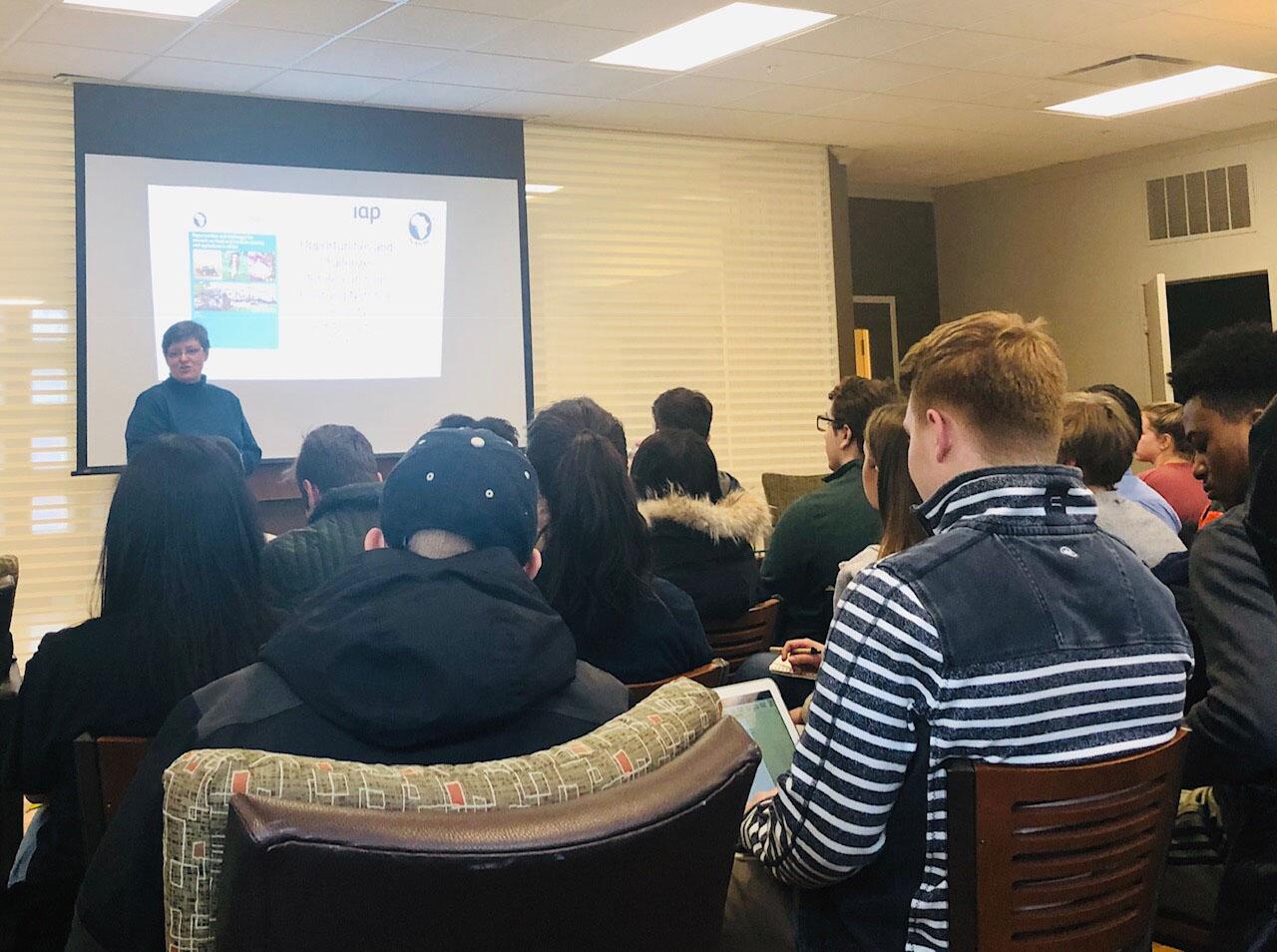ACES hosts South African scholar for perspective on food and nutrition security

The Office of International Programs in the College of Agricultural, Consumer and Environmental Sciences (ACES) hosted Dr. Sheryl Hendriks, a distinguished guest from the University of Pretoria in South Africa, to speak about opportunities and challenges for research on food and nutrition security and agriculture in Africa.
Dr. Hendriks serves as the Head of the Department of Agricultural Economics, Extension and Rural Development and Director of the Institute for Food, Nutrition, and Well-being at the University of Pretoria in South Africa. She has served two terms on the High-Level Panel of Experts for the United Nations’ Committee on World Food Security.
A full room of students, faculty, and staff gathered to hear Dr. Hendriks present highlights from a recent report published by the Interacademy Partnership (IAP) to which she contributed. The IAP, an international network of national academies of science, commissioned a set of regional reports on food and nutritional security and a global synthesis. The IAP Food and Nutrition and Agriculture (FNSA) global programme’s summary report brings out many similarities and differences in food and nutrition challenges across regions.
Hendriks began optimistically, “Since 2000, significant progress has been made in Africa through policy and communication from leaders to prioritize food and nutrition security.”
However, she noted, the situation remains fragile due to climate change, conflict, and migration.
The IAP report highlights six opportunities for using science, technology, and innovation to achieve food and nutrition security in Africa. Examples that Hendriks provided for each opportunity are included below.
Strong political commitment informed by scientific evidence
Hendriks noted frequent communication breakdowns between researchers and the policymakers they seek to influence. She noted particularly, “Researchers and policymakers need to engage for mutual learning and benefit. For example, closely monitoring land use change and determining its impacts on food security at different levels and also ensuring these investments do not degrade the natural environment but lead to inclusive economic growth and viable employment opportunities – especially for women and youth.”
Improved agriculture and food system efficiency
Hendriks pointed to many specific areas in which additional knowledge could lead to improved food systems efficiency. For example, “Researching how to improve the efficiency of livestock and aquaculture rearing and feed quality is equally important for food and nutrition security in Africa.” The importance of these food and animal products systems is growing in Africa with growth in incomes, urbanization, and changing dietary patterns, and that evolution is revealing needs for new knowledge to inform policy.
Improved farming system resilience
The threats of unsustainable resource management are very visible in Africa. The IAP report emphasizes the need to enable farmers who manage natural resources to make sustainable choices. “Monitoring changes in the environment through the soil and water mapping can support agricultural production decisions at all levels. Getting this information into the hands of African farmers to support decision making is essential. Technology is key. There are more cellphones in Africa than people. This has huge implications.”
Improved food system efficiency, human health and well-being
The food systems approach to food and nutritional security in Africa reveals a link between health outcomes and postharvest food management. Nutrient dense fruits and vegetables may suffer great losses after harvest, and improved food systems are needed to address those losses. “In South Africa, mangoes are so plentiful that people are stepping on them. But you can only eat so many mangoes in a day. Improved storage, preservation, and packaging is necessary to retain nutritional value, ensure food safety, and extend seasonal availability and reduce post-harvest losses and food waste.”
Improved food safety and waste reduction
Hendriks noted that a weak cold chain not only leads to food losses but can also contribute to food safety failures. “Africa has a great shortage of cold storage and refrigeration. The power goes on and off, and this can be worse than learning to cope with no power at all. The use of solar energy is an important area to explore.” In the meantime, a weak power grid can result in disruptions in the cold chain and increased food spoilage, with some spoiled food remaining in the food systems.
Stronger and much more human capacity
Ultimately, the IAP report places academic institutions as key to addressing food and nutrition security in Africa through research, teaching, and extension. As Hendriks noted, “African academic institutions must work to develop food security and nutrition capacity at all levels of society and across traditional disciplines. Increased effort is needed to ensure a well-trained extension service that is constantly updated.”
“The Africa we want”
Hendriks ended on a positive note, “There are solutions for all of these challenges. Using science, technology, and innovation, the world does have what is needed.”
As part of her visit to campus, Hendriks met with several ACES faculty and administration. The College of ACES will continue strengthening its partnership with The University of Pretoria when Hendriks and her colleagues host the ACES Academy of Global Engagement (Global Academy) this summer. Learn more about the University of Pretoria here.